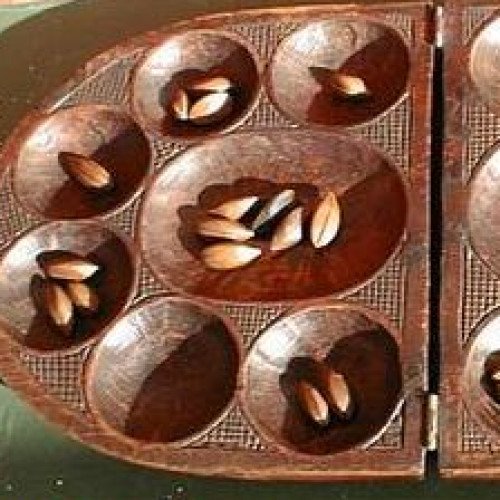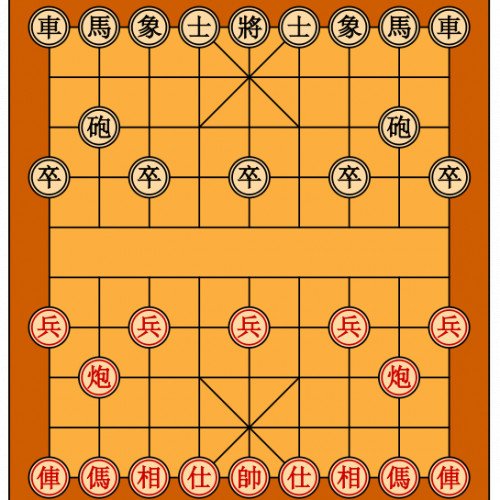OWARE VS XIANGQI

OWARE
Oware is an abstract strategy game among the Mancala family of board games (pit and pebble games) played worldwide with slight variations as to the layout of the game, number of players and strategy of play. Its origin is uncertain but it is widely believed to be of Ashanti origin. Played in the Bono Region, Bono East Region, Ahafo Region, Central Region, Western Region, Eastern Region, Ashanti Region of Ghana and throughout the Caribbean, Oware and its variants have many names - Ayò, Ayoayo (Yoruba), Awalé (Ivory Coast, Benin), Wari (Mali), Ouri, Ouril or Uril (Cape Verde), Warri (Caribbean) Pallanguzhi (India) Wali (Dagbani), Adji (Ewe), Nchọ/Ókwè (Igbo), ise (Edo), Awale in (Ga) meaning Spoons in English according to the Ga name for the game. A common name in English is Awari but one of the earliest Western scholars to study the game, Robert Sutherland Rattray, used the name Wari. The game requires an oware board and 48 seeds. A typical oware board has two straight rows of six pits, called "houses", and optionally one large "score" house at either end. Each player controls the six houses on their side of the board, and the score house on their end. The game begins with four seeds in each of the twelve smaller houses. Boards may be elaborately carved or simple and functional; they may include a pedestal, or be hinged to fold lengthwise or crosswise and latch for portability and storage with the seeds inside. While most commonly located at either end, scoring houses may be placed elsewhere, and the rows need not be straight. When a board has a hinged cover like a diptych, the scoring houses may be carved into the two halves of the cover, and so be in front of the players during play. The ground may also be used as a board; players simply scoop two rows of pits out of the earth. In the Caribbean, the seeds are typically nickernuts, which are smooth and shiny. Beads and pebbles are also sometimes used. In the West, some cheaper sets use oval-shaped marbles. Some tourist sets use cowrie shells. The game starts with four seeds in each house. The objective of the game is to capture more seeds than one's opponent. Since the game has only 48 seeds, capturing 25 is sufficient to win the game. Since there is an even number of seeds, it is possible for the game to end in a draw, where each player has captured 24.
Statistics for this Xoptio

XIANGQI
Xiangqi (Chinese: 象棋; pinyin: xiàngqí; Wade–Giles: Hsiang ch'i; English: /ˈʃɑːŋtʃi/), also called Chinese chess or Elephant chess, is a strategy board game for two players. It is one of the most popular board games in China, and is in the same family as Western chess, chaturanga, shogi, Indian chess and janggi. Besides China and areas with significant ethnic Chinese communities, xiangqi is also a popular pastime in Vietnam, where it is known as cờ tướng. The game represents a battle between two armies, with the object of capturing the enemy's general (king). Distinctive features of xiangqi include the cannon (pao), which must jump to capture; a rule prohibiting the generals from facing each other directly; areas on the board called the river and palace, which restrict the movement of some pieces (but enhance that of others); and placement of the pieces on the intersections of the board lines, rather than within the squares. Xiangqi is played on a board nine lines wide and ten lines long. As in the game Go (圍碁; or Wei ch'i 圍棋), the pieces are placed on the intersections, which are known as points. The vertical lines are known as files (Chinese: 路; pinyin: lù; "road"), and the horizontal lines are known as ranks (Chinese: 線/綫; pinyin: xiàn; "line"). Centred at the first to third and eighth to tenth ranks of the board are two zones, each three points by three points, demarcated by two diagonal lines connecting opposite corners and intersecting at the centre point. Each of these areas is known as 宮 About this soundgōng, a castle. Dividing the two opposing sides, between the fifth and sixth ranks, is 河 hé, the "river". The river is often marked with the phrases 楚河 About this soundchǔ hé, meaning "River of the Chu ", and 漢界 About this soundhàn jiè, meaning "Border of the Han", a reference to the Chu–Han War. Although the river (or Hanchu boundary) provides a visual division between the two sides, only two pieces are affected by its presence: soldiers have an enhanced move after crossing the river, and elephants cannot cross it. The starting points of the soldiers and cannons are usually, but not always, marked with small crosses.